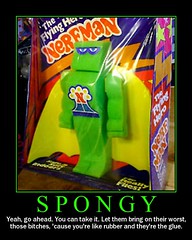I'm at a conference today that is focused on games and learning, and there's a whole lot of thoughts running through my head.
What's the deal with "incidental learning" or "accidential learning" as some people like to call it? Seems to be a favorite phrase of people here, as if hoping that spending thousands of hours playing online games
have to produce meaningful learning. One gentleman had the onions to acutally admit that he learned some geography about the Carribbean Islands after playing "Pirates" for (literally) months. Huh? So what?! I still see no evidence of complex thought or learning of any significance that can be attributed to this phenomenon. So why keep using it as an excuse to shove it at schoolchildren when no actual value can be found?
On that note, someone did mention that if this "accident" happens to expose a student to new ideas or interests than they otherwise would not have known, then it's not necessarily a bad thing. Good point. But then it falls into a different category.
A colleague today at dinner was listening to one of my projects and actually sincerely told me my idea was "brilliant." I think that's a first one for me, no one has ever used that word with me before. But of course, I can't really believe it, unless I also believe all those people who tell me my stuff is crap.
Another woman asked a group of MMORG players/developers to help with an "anomoly in her data," as she described it. For some unknown reason to her, around 30% of the players in the MMORG she was studying would not admit that they were learning any real-world transferrable skills by participating in the game environment. No matter how much she pushed them, they insisted they were just playing a game.
How rude, and truly unbelivable, she thought! Members of this group were quick to assure her that these gamers had a culture where they do not admit to participating in anything establishment, and certainly not anything educational. Either that, or they were simply not aware of the many transferable skills they were learning. Well, I suppose this could be true. But rather than assume a conclusion that the players were too stupid to realize the results of their own actions, or that they must be jaded youth who refuse to cow-tow to mom-and-dad's view of what's good for them, why don't we actually consider the possibility that THEY AREN"T LEARNING ANY TRANSFERRABLE SKILLS. To this group, that's apparently an unthinkable option. It was never brought up as a possibility. A nice example of losing all form of subjectivity when participating in, and taking stock in, the environment that you're studying.
Madison, Wisconsin is a beautiful place with great people. I keep wanting to make cheese jokes but dangit, everyone is so darn pleasant it's difficult to make fun. Plus, those folks at Playboy know what they're doing when they rate party schools. The nightlife in the middle of summer on a Thursday is better than any after-finals parties in Utah.
My presentation went very smooth, and I think might have some footing for a follow-up presentation next year if I want to come back. If tomorrow is as good as today, I think I probably will want to.
I need to buy one of those foam cheese hats. They cost $20 and I'd never wear it. But I gotta have one.
Oh by the way, the picture here is a familiar one-- my fave childhood toy Nerfman, but this version is surrounded by one of those horrendous "successories" kinds of formats. Want to mock these things by creating one of your own? Go to
this site.



